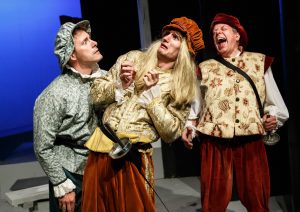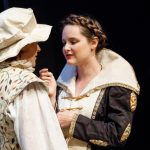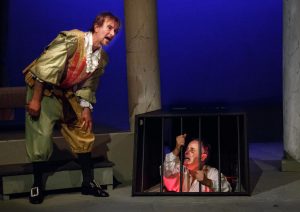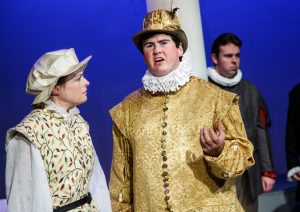Review: Shakespeare’s Twelfth Night
THE NOMADS “Twelfth Night” 28th September 2016 - Noda review
This oft staged Shakespeare comedy is described in the director’s notes as “a delightful and raucous frolic with improbable coincidences etc.” The play usually opens with one of the Bard’s most famous lines “if music be the food of love, play on” spoken by Duke Orsino of Illyria, where the play is set. Director Andrew Hamel-Cooke, however, transposed the opening scene in the Duke’s palace with the sea coast and shipwreck scene, which sets up the story to come, leading to greater ease of understanding.
There have been myriad takes on this “romcom” of Shakespeare - “romcom” thankfully being one word he did not invent. Andrew saw distinct parallels with the age of free and anything goes love of the nineteen sixties and chose music from that exciting decade throughout to amply illustrate his point. Some examples were: All you need is love (Sebastian and Olivia) - Are you lonesome tonight? (to Malvolio in his captive “room”) - It’s not unusual (when Malvolio is accosted by Sir Toby, Sir Andrew and Fabian) - Going to the Chapel (Olivia and Sebastian) - and Everlasting Love (show exit music). This brought the play’s theme of love and comedy neatly into the present, since love is immortal, and so is Shakespeare.
The delightful Nomad Theatre was a perfect setting for this so well known play.

Fabian, Sir Andrew and Sir Toby
The basic sets of Orsino’s Palace, Olivia’s house and garden, the sea coast and a nearby street were set out well with the stage doubling as Olivia’s house (stage left) and the palace (stage right) with prominent pillars across stage. Set construction was by the in-house team and sensibly was not too ornate, which focused attention on the actors.
The period costumes were most authentically sourced and provided by Jenny Hasted and Jennie Hamel-Cooke. If I am not mistaken, several had come from Kris Benjafield. The costumes were extremely effective and well fitted, thankfully.
Lighting, as usual at the Nomad theatre, was provided by the painstaking team of Tony and Dee Bowdery and sound was by Tim Williams. The lighting and sound effects were skilfully handled throughout to their great credit.
The cast was a very strong one, with no weak links. Strong and charismatic performances were given by all the main characters on stage.

Viola (as Cesario) and Olivia
Helen Dixon in the pivotal duel roles of Viola and Cesario (in male attire) was truly outstanding as was the ultra elegant Sarah Wilson as Olivia. Two talented ladies without doubt!
I hugely enjoyed the antics of the distinctly merry and indefatigable Sir Toby Belch, inhabited rather than acted by Murray Stephen. He was matched by the splendid and effete foppishness of Daniel Shepherd as Sir Andrew Aguecheek; his reluctant duel with Cesario, each mistakenly believing the other to be a ferocious fighter, was a comic highlight.

Feste taunts Malvolio
It is hard to warm to the ridiculous Malvolio with his pomposity and conceit, but I certainly warmed to the talent of Graham Botterill, who breathed authenticity into this easily fooled character. His hapless wail of self-pity from the confinement of his cramped “gaol” beneath the stage actually moved me - I had to remind myself that he was acting and not in real distress! What a boon is a stage trap door.
Michael Ayres imbued Feste with an impish charm and devious cunning, combined with fine unaccompanied and also self accompanied singing and nimble feet - a true clown.

Feste the fool
Richie Halsey Watson was a forceful Duke Orsino more in love with being in love itself than with either Olivia or Viola. He beautifully captured the wonderful “sickness” of being in love with love.
Stuart Finlayson really hit the mark as the determined Sebastian, Viola’s presumed drowned (by her) twin brother - he showed huge presence throughout his scenes.
Andrew Hamel-Cooke, very late in the rehearsal period we learned afterwards, played the pirate (or was he?) Antonio. He won’t want me to say he stood out, so I won’t - but he did. Oops!
Moyra Brookes added artful guile and feminine wiles to the scheming Maria, her zest truly bringing this role to life.
Giovanni Tagliarini and Oliver Forsyth did well as Valentine and Curio respectively. Matthew Weaver was a thoroughly suitable choice to play Fabian and he was also a Sailor. Jason Lambert was a realistic and weathered Sea Captain. Sid Dolbear was a believable Priest. Jason and Sid also played Officers 1 and 2. Rita Derriman was a Lady in Waiting.
This complicated and multi layered love comedy with its mistaken identity at the heart of much of the confusion and comedy was a marvellous vehicle for a richly talented company of players like the Nomads. The director had worked in great depth with the performers upon the interaction, absurdities and human qualities of the many flawed characters. I would praise the diction of all on stage as I could clearly hear every word, which is not usual in amateur theatre. The casting of the players as their various characters was well chosen. The captivating performance eventually came to it’s most enjoyable end with the energetic Feste singing of the wind and the rain and with these final lines, ” But that’s all one, our play is done, And we”ll strive to please you every day.”
Your striving certainly succeeded , Nomads!
Jon Fox
The Nomads are members of NODA, which has a membership of 2500 amateur theatre groups and 3000 individual enthusiasts throughout the UK, staging musicals, operas, plays, concerts and pantomimes in a wide variety of performing venues, ranging from the country’s leading professional theatres to tiny village halls.

Local theatre reviewer, Polly, reviews the September production of Shakespeare’s Twelfth Night, directed by Andrew Hamel-Cooke.
The Nomads - “Twelfth Night” - 29th September, 2016
“I went to see this show on Thursday Sept 29th. What a treat! It was an excellent production.
The play opened with what appeared to be a a scene on the very front of stage, but the gradual bringing up of the lights revealed a very lovely tableau set behind a gauze, which gradually “came to life” with the lifting of the gauze, the bringing up of more lights and the opening lines by the Duke Orsino.
The single set was exquisitely simple with two centrally placed columns. There were two rostra representing Olivia’s house stage left and Orsino’s stage right. Downstage, again on each side, were rostra and benches. The only things added during the play were some moving trellises behind which Aguecheek and his friends, watched the humiliation of poor Malvolio, and later the bars of a prison. The bars were cleverly placed over a trap-door which gave a dramatic sense of Malvolio’s being cast into the darkness of a dungeon.

Feste taunts Malvolio
It was real joy to see a Shakespearean play dressed in period. The previous evening, I had watched a professional production of one of Shakespeare’s works dressed in rather bizarre sort of modern dress and it was a complete distraction.
The Nomads production was elegant and restrained. The only real pattern and colour was reserved for the twins, Viola and Sebastian. and Malvolio’s cross gartered yellow stockings. My one criticism would be that Orsino’s (Richie Halsey Watson) costume didn’t really hang well on him. It was just too big? It reduced the dignity of his otherwise confident and clearly delivered performance. His walk perhaps was a little too rustic for a Duke!! Perhaps again attributable to the costume??
Olivia’s delivery (Sarah Wilson) and movements were suitably stately. Most of the time her lines were well pointed and conveyed the meaning clearly. There were however moments of under projection.
There was a very impressive evenness in the quality of acting. Viola/Cesario (Helen Dixon) was an excellent reading of the role. There was a sense of ease in the way she/he delivered familiar lines. Sebastian, (Stuart Finlayson) when he finally arrives fairly late in the play, also gave an assured and well placed performance.
The comic interludes featuring Sir Toby Belch (Murray Stephen) had a fabulous speaking voice, Andrew Aguecheek (Daniel Shepherd) was gloriously inept but amusingly agile and the very wicked and very focussed Maria (Moyra Brookes) was very well played. Who could have watched the drunken scenes and those behind the trellises with Fabian (Matthew Weaver), and not fallen about with laughter?

Fabian, Sir Andrew and Sir Toby
The fool, Feste (Michael Ayres) was superbly equipped to play the role. The so familiar lines were clean and clear and the singing was absolutely right in mood and execution. Feste is one of the most famous of Shakespeare’s fools and in my opinion, one of the best. It was really lovely to have him presented in the way he deserves.

Feste the fool
Malvolio (Graham Botterill) is a cruel and hugely tragic role, in stark contrast to the tomfoolery of the real comics of Aguecheek and Belch and Maria. However, his pomposity makes him an obvious victim for some prank and deception. Malvolio was a little vocally restrained at first but was physically most convincing. He could perhaps have been a little more pompous initially so as to offer a real contrast to the savage cruelty served on him in the madness scene. However, it was a very dignified final scene and I did feel real sympathy for him.
The supporting roles helped to give the whole piece a sense of cohesion and structure. It was all in all, a very fine production particularly as it is a small amateur production.
The use of much more modern music was a witty and amusing idea. For someone like me who was not altogether familiar with the music used and who was much more interested in the beautiful language, it served only as an irritant. That is a personal opinion but the only weakness I would mention. It was particularly sad, I thought, as Feste had brought live music to the play which was a real and impressive bonus.
Thank you once again for a most enjoyable evening at your beautiful theatre. It deserves much greater support.”
Polly